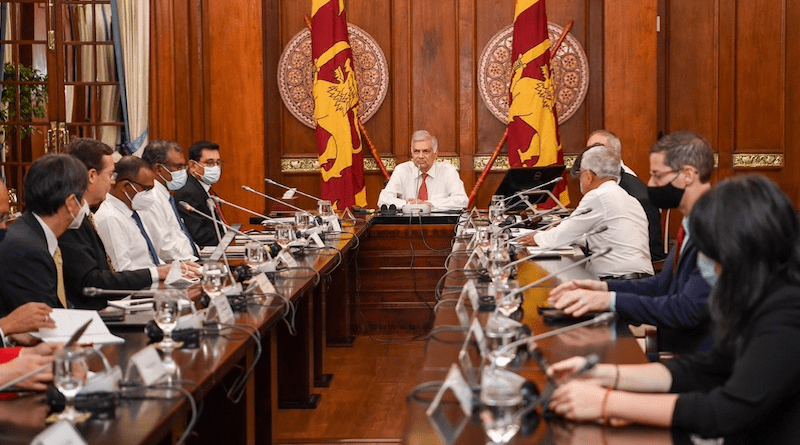Sri Lanka’s Foreign Policy During Crisis Recovery – Analysis
By Institute of South Asian Studies
By Rajni Gamage
Sri Lanka’s President Ranil Wickremesinghe attended the United Nations General Assembly (UNGA) in the United States (US) in September 2023, where he emphasised the urgency of mobilising climate finance and international solidarity for smaller, climate-vulnerable and debt-inflicted countries such as Sri Lanka.
Wickremesinghe called on the developed countries to aid and share responsibility in restructuring the international financial system to address climate change and ensure sustainable development. Sri Lanka is already experiencing extreme climate events, such as the recent drought and its impact on the nation’s already-weakened food security. He also stressed the importance of international rules-based cooperation and multilateral platforms, ranging from issues of international trade to ocean governance.
In September 2023, Sri Lanka assumed a two-year role as Chair of the Indian Ocean Rim Association (IORA), taking over from Bangladesh. The IORA Council of Ministers meeting was held in Colombo on 11 October 2023. The foreign ministers of India, Bangladesh, Mauritius, Iran, Malaysia and South Africa are confirmed to attend, alongside senior-level participation from 16 member countries and 11 dialogue partners (including China and the US). The foreign ministers will deliberate on the IORA’s key areas of cooperation – trade and investment, maritime safety and security, fisheries management, disaster risk management, and the blue economy.
Importantly, the Sri Lankan president’s remarks in the UNGA acknowledged that the Indo-Pacific concept has gained traction, primarily due to mounting challenges from China. This, in turn, has driven a re-evaluation of regional dynamics and cooperation by the IORA members. For example, he stated that the G7’s attempt to involve the European powers and the North Atlantic Treaty Organization in the Indo-Pacific was met with opposition, as it was seen to violate the IORA’s rules-based order. He also emphasised the need for the IORA to accommodate the Indo-Pacific concept, recognising the interconnectedness of the Indian and Pacific Oceans and enabling cooperation among small island states in both regions.
Foreign Relations During Crisis Recovery
Sri Lanka’s foreign relations are influenced significantly by attempts to recover from the national economic crisis in 2022. The country’s inflation has fallen to a single digit (4.6 per cent) after two years, one of the world’s highest a year ago. In March 2023, Sri Lanka secured a US$2.9 billion (S$3.9 billion) International Monetary Fund (IMF) Extended Fund Facility Arrangement. However, its economic situation remains precarious, with a foreign reserve of only US$3.6 billion (S$4.9 billion) reported in August this year and with foreign debt restructuring still in progress.
To this end, the government has been working with bilateral creditors and institutional investors (who account for a significant portion of Sri Lanka’s foreign debt in the form of international sovereign bonds/investment security bonds). Despite working with all key bilateral creditors, Sri Lanka’s failure to secure a concrete debt relief framework from China (its largest bilateral lender) is said to be among the reasons for a delayed second payment of US$330 million (S$450 million), in line with the IMF bailout package. In addition, the IMF’s review stated that despite economic reforms implemented by the government, revenue targets have fallen short of initial projections by around 15 per cent.
Leaning Towards its Largest Neighbour
Sri Lanka has had to manage its key geopolitical relations against this economic backdrop. In September 2023, news of an impending Chinese research ship docking in Sri Lanka raised concerns among Sri Lanka’s Indian and US counterparts. In previous years too, India voiced security concerns over Chinese ships and submarines docking at Sri Lanka’s Colombo and Hambantota ports. In response, Sri Lanka’s Foreign Minister Ali Sabry stated that Sri Lanka had “not given permission to the Chinese vessel Shi Yan 6, as Indian security concerns were important to the island nation”.
Sri Lanka’s efforts to appease India were also evident in the foreign minister supporting India in the recent India-Canada controversy. He linked the unfolding bilateral episode to Sri Lanka’s own experience with the Liberation Tigers of Tamil Eelam, stating that “some of the terrorists have found safe haven in Canada” and that the Canadian government has continued to perpetuate the narrative that a genocide had been committed during Sri Lanka’s civil war.
Maintaining Non-alignment
The Sri Lankan government is also keen to not antagonise China. While addressing an audience on ‘Ocean Nations: The 3rd Annual Indo-Pacific Islands Dialogue’ in New York in September 2023, the Sri Lankan president dismissed concerns that it was a Chinese “spy ship” and stressed the routine nature of this visit by a “research vessel”. He also highlighted the reluctance of island nations in the Indian Ocean and South Pacific, such as Sri Lanka, to get caught in major power disputes as they had their own interests and sovereignty to protect.
In the face of emerging global power re-configurations, the Sri Lankan government and political leadership recognises the growing challenges to ‘nonaligned’ countries in the Global South. In a world with expanding security alliances and increasingly disparate North-South inequalities, Wickremesinghe has emphasised the importance of recognising the interconnected nature of these emerging global and regional threats and the importance of building inclusive futures.
About the author: Dr Rajni Gamage is a Postdoctoral Fellow at the Institute of South Asian Studies (ISAS), an autonomous research institute at the National University of Singapore (NUS). She can be contacted at [email protected]. The author bears full responsibility for the facts cited and opinions expressed in this paper.
Source: This article was published by Institute of South Asian Studies (ISAS)

